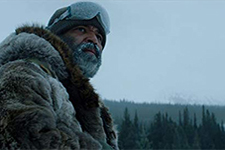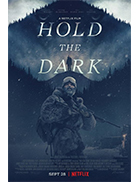Hold the Dark
|  As the title suggests, Jeremy Saulnier’s Hold the Dark offers a stark dive into the heart of darkness, in this case personified by the remote Alaskan wilderness, where the line between civilization and ferality is a thin one indeed. Saulnier, the director of the vicious revenge drama Blue Ruin (2014) and the grisly fight-for-survival thriller Green Room (2016), is no stranger to violence and the bleakest pits of the human soul, and if Hold the Dark marks any kind of growth in his particular brand of brutal artistry, it is its ambition to connect intimate character dynamics to something larger and more mythic. It doesn’t always work, as the plot in Hold the Dark is at times maddeningly vague, but it casts a spell of such intensity that it’s impossible to dismiss. The film begins with the apparent snatching of a young boy by a pack of wolves, which drives the distraught mother, Medora Slone (Riley Keough), to contact Russell Core (Jeffrey Wright), an aging naturalist who once spent a year living among wolves and wrote a book about the experience. For reasons that are left largely unstated, Russell agrees to travel to the remote corner of the Alaskan mountains that Medora calls home and hunt down the wolf that took her son. We learn that Russell is estranged from an adult daughter who lives in Anchorage, which may partially explain why he is willing to take on this odd request that he received via a handwritten letter. At the same time, we follow Medora’s husband, Vernon (Alexander Skarsgård), who is a U.S. soldier stationed in Afghanistan (the story takes place in the early 2000s). We quickly realize that something is not right with him and that violence courses deep in his veins, so when he is wounded and send back home, we know it can only mean trouble. As it turns out, there is more to the child’s disappearance than wolves, and soon Medora also vanishes and Vernon sets out to find her, aided by his friend Cheeon (Julian Black Antelope), a particularly bitter member of the Yup’ik natives. It only gets darker and more twisted from there, as Russell finds himself caught up in a series of intersecting plots that pit the various characters against each other in ways that you probably won’t see coming. At one point a character turns a confrontation with the police, who is embodied by the fundamentally decent Donald Marium (James Badge Dale), into a full-scale massacre, while at other points characters seem to lose their humanity to some kind of animal spirituality, donning wolf masks and not just killing others, but slaughtering them. The presence of the wolves is a constant throughout the film, and they suggest not just raw animality, but also a certain dignity in the wilderness that is matched only by the viciousness with which they survive (a key scene finds a pack tearing apart one of its own cubs, an apt metaphor if ever there were one). Danish cinematographer Magnus Nordenhof Jønck captures the foreboding grandeur of the Alaskan wilderness; his images have a bitter chill and an impending sense of doom that is essential to the film’s effectiveness. The wilderness itself is really the film’s most fascinating character, as the humans are largely symbolic in effect and spend most of the film grimacing or looking forlorn (James Badge Dale’s police sheriff is the closest approximation of well-rounded humanity). There are a number of twists and turns in the screenplay by actor and frequent Saulnier collaborator Macon Blair, who adapted William Giraldi’s critically acclaimed 2014 novel of the the same name, but virtually all of them lack clearly defined character motivations and logic. That is not necessarily a detriment, as Hold the Dark operates in a netherworld in which various planes of experience conflict and overlap: civilization and wilderness, human and animal, family and individual, natural and unnatural. There are a lot of big, heady themes woven throughout the story, none of which are ever fully developed, but rather are left as tantalizing, ambiguous nods toward deeper philosophical wells. The film’s ending is weirdly abrupt, although it feels somehow fitting given the suddenness with which violence erupts throughout the story. It is, in its own way, hopeful, even as it allows for the idea that evil is not always punished and that some of those in the darkness don’t escape or even want to, but rather soldier deeper into it. Copyright © 2018 James Kendrick Thoughts? E-mail James Kendrick All images copyright © Netflix |
Overall Rating: 

 (3)
(3)


